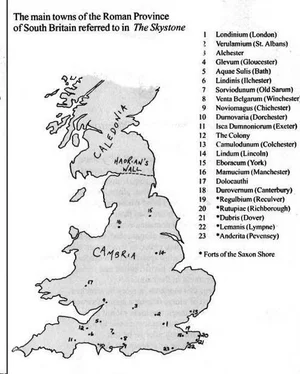I blinked at him. "What did I say?"
"You called me General, and that's what I'm missing. Soldiering, Publius! The excitement, the challenge, the movement, the constant stimulation and requirement to be prepared for anything. The constant need to think on one's feet and keep abreast and ahead of developments. " I had stopped walking, too, and now I was staring at him in amazement. He took my stunned silence for recognition of the problem.
"Don't you agree?"
"Agree?" I said, hearing the wonder in my own voice. "I can't even believe what I heard! General, can you recognize horse turds when you see them?"
His gaze went blank. "What d'you mean? Of course I can. "
"So can I. " I nodded. "Aye, and I can hear them when they hit the ground, too, fresh dropped. But I seldom hear them dropping from the horse's mouth. "
The old Britannicus surfaced quickly. "Varrus, what in Hades are you talking about?"
"What you were talking about. Horse shit. I've never heard the like. You were the one who loved to talk for hours about the pettiness and uselessness of the military life — the inactivity, the boredom, the frustration, the bureaucratic meddling, the ineptitude and the general folly bred by the army's 'hurry up and wait' mentality. " I stopped to draw breath, and he did not interrupt me as I continued. "You know, if I didn't know who I was listening to, I'd be tempted to think you were sorry for yourself. But I know that's not the case. You've a huge job to do here in this Colony, and you're doing it well. What you're feeling right now will pass. It's nostalgia for a way of life that's over. You've done it all. Trying to repeat any part of it would drive you insane. The job you have to do today means more, and demands more, than anything you've ever tried before. " Now it was he who stared open-mouthed at me. "By the living Christ, Varrus, " he breathed, his eyes wide in wonder, "you've never dared speak to me like that before. I've never heard you talk to anyone like that! You're really eloquent in fury... I must have pissed on your cooking fire to make you that angry!"
I could see laughter dancing in his eyes, and I tried to keep my own face stern.
"You did, " I snarled, "and no wonder!" I tried to mimic his earlier words, but the harder I tried, the louder he giggled, and the more foolish this whole conversation seemed. "The activity of soldiering! Judge him not, ye gods! The excitement! The requirement to be prepared for anything... The horse turds and the dung in the mutton stew... Gods! I may puke!"
I couldn't even talk after that. Caius was giggling openly and helplessly, like a boy, and my own laughter broke out in guffaws, so that our hilarity fed upon itself and we staggered around, clutching at each other for support until our knees gave way as completely as our dignity, both weakened by our hysteria, and we collapsed to the grass. From that day forward, there was no more talk between us of discontent, or of nostalgia for the days that were gone. Our friendship grew richer by another layer of shared experience and we dedicated all our time and our collective energies to the development of our Colony.
Luceiia and I came to know each other better, too, during those quiet days, and our first-born arrived with summer. A girl, Victoria. An angel child who grew lovelier with each passing day, as had her mother in carrying her. Today, decades later, I can clearly recall the amazement with which I watched Luceiia grow more beautiful from day to day as her pregnancy advanced, so that by the time she came to term, she was radiant, shining with health and wholesome ripeness, flaunting her femininity and carrying her belly proudly before her as a symbol of her feminine ascendancy. The birth itself was astonishingly easy, involving little time and — according to my wife — little pain, so that motherhood in all its aspects came easily to her, and such was her pleasure in the entire process that she was with child again in less than a year. Throughout the period of both pregnancies, I struggled with my skystones, which remained obdurate in the face of all Equus and I tried to do, refusing to melt and yield their secrets.
Caius had his hands full that summer, and the one that followed, too, learning to administer our Colony. The death of Tonius Cicero, and the consequent loss of his counsel, influence and power to find and recruit new colonists, had been a blow to our plans, but we continued as before, goaded to new urgency by the suddenness of the previous year's developments.
Caius and I together began training the Colonists formally in the art of soldiering. We drilled our conscripts brutally, especially the young men, training them in the ancient way — toughening them to run and march and walk laden with heavy packs and spears and the true legionary's heavy fighting shield, the scutum. And the men responded magnificently, for they shared our dream and knew that our survival might depend at any time upon their fitness to repel attack.
In the long summer evenings, Caius set everyone to work refurbishing the ancient hill fort at our back. It had no name, because until Caius Britannicus told everyone what it was, no one had ever known it was a fort. It was just a hill, and it had always been there, completely disregarded, until a bright summer afternoon in that year between the birth of my first child and the conception of my second. That day, Caius loaded more than twenty of the most influential Colonists into a brace of wagons and led them out into the fields and over to the base of the hill, about a mile from the Villa Britannicus. There they disembarked from the wagons to be told that the kitchen staff from Caius's villa had arrived earlier in the day and had prepared a meal for them on the summit. By this time, of course, there were far more people at the scene than those who had set out with Caius. The sight of two wagons loaded with people heading out and away, obviously bound for somewhere specific, had attracted many followers, and there must have been close to a hundred people climbing the hillside that day.
At the top, Caius's people were waiting with bread and ale, nuts and roasted grain, crushed, sweet berry paste and a whole sheep roasting to perfection on a spit. When their meal was over, Caius demonstrated the reason for his efforts to get everyone up there. He had prepared a model of the hilltop and used it to aid his demonstration of the defensive genius of the early Celts, the people who had built the place, thousands of years earlier.
The entire top of the hill was laid out in concentric ramparts, separated by deep ditches, and the extreme centre, a level, roughly circular area about a hundred paces across, had evidently been intended to serve as the final refuge of the defenders. The layout was simple, and for all practical purposes impregnable. Any attacking force first had to climb the steep hillsides and then begin an arduous and bloody struggle to the centre, forced to fight their way across each ditch and then to climb each rampart before sliding down into the ditch that lay behind it. And throughout all of this, the defending forces on the ramparts always had the upper hand, retreating from crest to crest only after they had wreaked maximum damage on the advancing attackers massed below them.
When Caius had pointed all of this out to everyone, he also pointed out the inevitable corollary: any defenders prepared to commit themselves to the defence of the fort as it stood must also be prepared to die, should the attacking force be numerous enough or stubborn enough to accept the losses inflicted upon them. That, Caius suggested, needn't be inevitable. This fort was defensible, he suggested, but it would be ten to a hundred times more secure were it surrounded by a wooden wall of pallisades. It would be a thousand times stronger were those walls of stone. Such was his eloquence that no one argued.
Читать дальше









